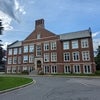Central Mass. incubators allow entrepreneurs to launch and grow their businesses
 PHOTOs/RICK SAIA
David Crouch founded ten24 Digital Solutions in 2008.
PHOTOs/RICK SAIA
David Crouch founded ten24 Digital Solutions in 2008.
David Crouch had been looking to join a business incubator ever since he launched a digital services company. But for the longest time, he had nowhere to turn locally.
Cambridge was the nearest site with incubation space when ten24 Digital Solutions was founded in April 2008. However, Crouch owned a home and was raising children in Shrewsbury, which made relocation or a long daily commute unpalatable.
So ten24 set up shop in Northborough, but has struggled to attract young developers to its suburban office condo. And with plans to expand from 13 to at least 25 employees by 2019, appealing to recent college graduates will become even more vital.
That's why ten24 relished the chance to become the anchor of an 11,000-square-foot incubator slated to open in downtown Worcester late this summer.
Crouch looks forward to mentoring startup companies in the former Telegram & Gazette building on Franklin Street, as well as receiving pointers on licensing and overseas expansion.
And with new digs in a cool, rehabbed building located close to 28,000 undergraduate students, ten24 expects to be able to recruit the workforce it needs to grow.
“We're really excited about the move,” Crouch said.
The Worcester Business Development Corp's Technology and Idea Development Exchange will be one of at least five innovation-oriented spaces to have opened in Central Massachusetts since 2012. Most of those spaces are incubators, which aid emerging companies with everything from financial and technical management to marketing and networking to securing outside funding.
Running Start opened a co-working space in Worcester's Gateway Park in 2012, TechSandBox launched a science- and technology-based incubator in Hopkinton in April 2013, Framingham State University opened a mixed-use incubator in January, and a national group started a temporary arts-themed incubator in Worcester in March to help the city identify and develop alternative-transit solutions.
In addition, Worcester Polytechnic Institute launched a virtual incubator in 2012 and, in January, hired Jim Giza, a former executive at travel search engine company Kayak, as its first entrepreneur-in-residence. Over the next few years, Giza said, the school plans to convert an old gym into an innovation center that will include incubator space.
Incubators are on the rise nationally as well, with the number of facilities having grown from 425 in 1991 to 950 in 2002 to 1,400 in 2012, according to a National Business Incubation Association (NBIA) survey.
“If you cross traditional boundaries, do you come up with new and better solutions?” asked Joyce Kressler, director of the Worcester Incubator, which is funded through the National Science Foundation and housed at the EcoTarium.
So far, the data seem to point to “yes.”
The median survival rate for business incubator graduates is 93 percent, the NBIA found. In contrast, more than half of companies that start up on their own fail within their first few years, said Dennis Powell, an NBIA spokesman.
Like Crouch, Barbara Finer also thought Central Massachusetts was missing an opportunity to nurture its top talent. Her work as an entrepreneurship coach and marketer took her into Boston or Cambridge three times a week, where she occasionally found herself meeting with fellow MetroWest residents. That prompted Finer to begin providing those same services closer to home through TechSandBox, which she founded 13 months ago.
“There are thousands of us living here that are involved in innovation and there was no way for us to get together,” Finer said.
Today, more than 100 people gather at the 8,700-square-foot incubator each month for training, conferences or workshop programs, she said. And 10 startups call TechSandBox home, with the ages of most of the entrepreneurs ranging from the early 40s to early 60s.
Yet the region still had no incubators between Hopkinton and Waltham, leading Robert Krim to figure there was some unmet demand.
He was right. Krim received 31 applications to join Framingham State's 1,000-square-foot Entrepreneur Innovation Center. He accepted six.
The average age of an entrepreneur in Krim's incubator is 32, and half of them are immigrants or women. Companies can spend either six or 12 months in the facility, paying rents of just $95 per month.
“Great innovations come out of this coffeehouse effect,” Krim said.
But that comes with a price tag.
Incubators frequently help businesses make money, Powell said, but tend not to be big moneymakers themselves.
Nationwide, more than 60 percent are not self-sustainable, according to NBIA data, and therefore need outside support. For this reason, the NBIA found that 85 percent of incubators have a sponsoring entity that can help bankroll the effort, at least early on.
Officials last month announced that the U.S. Economic Development Agency would chip in $1 million to help establish the incubator inside the old T&G building. And a lack of public-sector support can doom an incubation effort before it gets off the ground.
A few years ago, Fitchburg State University looked at transforming a downtown Fitchburg building into an advanced polymers manufacturing center, which would have included incubator space, David McKeehan, North Central Massachusetts Chamber of Commerce president, said in December. But he said a feasibility study found the effort would have required more than $1 million in renovations plus an ongoing subsidy, putting the idea on hiatus.
“You have to find a way to get the value across,” Giza said.n









0 Comments